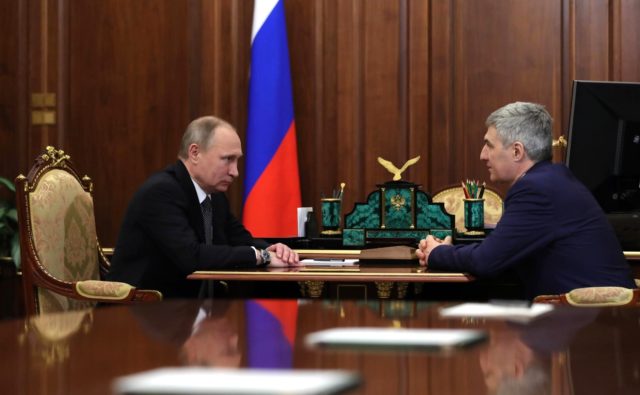
Russian Karelia: Further Repressions Instead of European Integration?
By:

In Russian Karelia, there had been no election for the office of head of the republic since 2002. This year (September 10), such an election was finally held; and on September 25, Arthur Parfenchikov was officially inaugurated to the position. He had been serving as “temporary acting governor” since February, when Russian President Vladimir Putin appointed him to the post.
The turnout for the September 10 local election in Karelia was low compared to other regions of Russia, which also held a vote on this day. Only 29 percent of citizens with the right to vote came to the polling stations, and of those only 61 percent voted for Parfenchikov. Simple algebra shows then Parfenchikov was elected by minority of the republic’s population, while the overwhelming majority simply ignored these elections. Nevertheless, under current Russian law, he became the legitimate head of the republic. The residents of Karelia were perfectly aware who the victor would be, given the lack of multi-party competition in modern-day Russia.
“Political technologists” (a post-Soviet term roughly analogous to Western campaign advisors, PR specialists and/or political analysts) for Parfenchikov’s election campaign assumed that he would win support as a “local native,” unlike the previous Kremlin appointee. But local Karelians were not so easily fooled. The Karelian poet and publicist Andrei Tuomi rejected official claims of Parfenchikov as a “native Karelian,” since the latter man comes from the Ladoga village of Kurkijoki: “This territory is occupied, annexed, seized—until 1940, it belonged to a completely different state” (After Empire, August 29).
Moroever, Arthur Parfenchikov had not lived in Karelia at all for the past ten years, but instead headed the Federal Bailiffs Service, headquartered in Moscow. It seems hard to believe that he would have voluntarily agreed to leave this high post and move to Karelia—which, through the efforts of previous Kremlin appointees, had been reduced to the level of a depressed “province.”
The Kremlin felt it was time to select a new Karelian leader because the previous head, Alexander Khudilainen, who controlled the republic in 2012–2017, pushed Karelia into an acute economic crisis, triggering massive protests by the local population (Svoboda.org, April 9, 2015). Khudilainen—the governor “with the Finnish name”—showed even greater indifference to the local conditions of Karelia than former Russian governors. Under Khudilainen, the Petrozavodsk University closed the department of Baltic-Finnish philology and culture, which was the only such department in the Russian University system (Vesti.ru, March 18, 2013).
In fact, Khudilainen somewhat resembled the Kremlin appointee to head Karelia during the Soviet era, Otto Kuusinen, under whom the republic became associated primarily with the first Gulag camps, such as Belomorkanal and others. Under Khudilainen’s rule, Karelia once again became associated with massive violations of civil liberties. It should be remembered that Mikhail
Khodorkovsky served the final years of his prison term in Karelia. Vasiliy Popov, the leader of the Karelian branch of the Yabloko party, was forced to apply for political asylum in Finland under threat of criminal prosecution (Svoboda.org, February 17, 2017). And in further similarity to the Soviet era, in 2016 Yury Dmitriev, a well-known historian and researcher of Stalinist-era terror, was detained in Karelia (Svoboda.org, June 1, 2017). Furthermore the republic’s “Center for Combating Extremism” routinely pursues bloggers simply for “likes” and reposts in social networks.
Modern Karelia could have had a completely different image. The republic is unique among all other regions in Russia in that it has the longest border with a European Union state, Finland, measuring about 1,000 kilometers. Even in the midst of political repression, cross-border Finnish-Karelian economic and cultural ties in the post-Soviet period were highly developed. In 2000, the project “Euroregion Karelia” united the Russian republic with three Finnish regions and sought to promote sustainable economic and social development. However, with the establishment of the further centralization of power in Russian politics and the curtailment of republican self-government, this project was abandoned (Mustoi.ru, February 25, 2016).
Today in Karelia, European integration programs have been completely forgotten. It is very indicative of future trends that the new governor is appointing “people in uniform” (his former colleagues from the Federal Bailiffs Service) for economic posts in the republican government (Mustoi.ru, September 21). These new appointees will certainly not have the right mindset for continued development of cross-border economic cooperation. Given the new leadership, it is possible that ordinary private trips of Karelian residents to neighboring Finland (for study, work or leisure) will now also come under suspicion. After all, these trips show to Russian citizens that the Russian propaganda claims of a “continuous crisis” in Europe are truly false.



